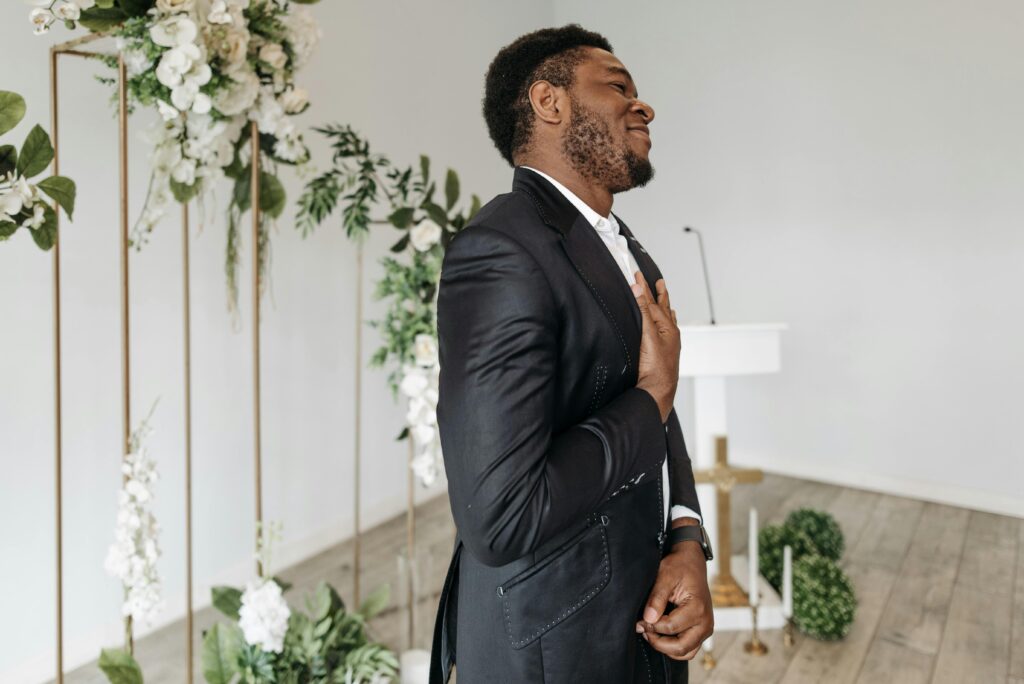- How to Shift From a Fixed Mindset to a Growth Mindset - February 4, 2026
- What Men Don’t Understand About Female Desire - January 22, 2026
- Seeing Your Partner Clearly: Appreciation, Gratitude, and Connection - January 2, 2026
How Men Can Lead with Presence, Appreciation, and Attunement
There is something quietly revolutionary about a man who chooses to show up. Not with grand gestures or perfection, but with presence. With curiosity. With the simple daily choice to notice his partner, care about her world, and take responsibility for his part in their connection. When men lean into that version of themselves, something profound happens. Their partner softens. Their home becomes safer. Emotional intimacy becomes a source of strength rather than confusion or fear. The relationship becomes a place where both people actually want to be.
In my work with men through Thriveways, I see such an incredible desire to love well. Most men genuinely want to be the partner who brings steadiness and security. They want to be competent in their relationship the way they try to be competent everywhere else. But they are often missing a clear roadmap. They do not always know what they are supposed to be paying attention to. They do not always feel equipped to face the emotional terrain that women navigate so naturally.
This is where Gottman Method tools help bridge the gap. John and Julie Gottman have spent decades studying what makes relationships thrive. Their research gives men practical ways to show up as the best version of themselves. When paired with a foundation of gratitude and appreciation, these tools become a daily practice of love.
This blog is for the men who want to step up. The men who refuse to be passive passengers in their own relationship. The men who understand that strength is not only measured by productivity but by presence. The men who want their partner to feel safe enough to relax into her feminine energy because she knows he has her heart in his hands and he handles it with care.
Let’s explore what that looks like in everyday moments.
Showing up as your best self: Presence, not perfection
Women do not need a flawless man. They need a partner who is engaged. Present. Attuned. A man who looks up from his phone when she walks into the room. Who pauses long enough to actually absorb what she is saying. Someone who cares enough to ask follow up questions. A partner who does not disappear into silence or irritability when things become emotionally uncomfortable.
Presence says: “You matter. I see you. I want to know you.”
The Gottman concept of Love Maps is a simple way to cultivate that presence. A Love Map is your mental map of your partner’s inner world. Her stresses. Her hopes. Her favorite music. The things she worries about at 2 am. The stories from her childhood that still shape her.
Every time you learn something new about her and remember it, you deepen the map. And when you deepen the map, you deepen the trust. The more you know what soothes her or overwhelms her, the more confidently you can show up with support rather than blunders.
Presence also means showing up when it matters most. When her voice tightens. When she falls silent. When the day has clearly taken more from her than she had to give. Presence asks: “How can I lighten your load right now.” Not because she asked you to, but because you noticed.
That noticing is the cornerstone of emotional leadership.
Turning toward connection: The small moments that build the big love
Connection does not live in luxurious vacations or candlelit make up sessions. It lives in bids. Tiny attempts to connect. A comment about something she saw online. A sigh while she washes dishes. A playful tap on your arm. A quiet request to sit together on the couch.
Every bid is a door. You can turn toward it, turn against it, or turn away from it. Gottman research shows that relationships thrive when partners turn toward bids about 86 percent of the time. Not perfectly, just consistently.
Turning toward says: “I am available to you.”
Turning away says: “You are on your own.”
Turning against says: “You are a problem.”
Every response builds a culture. A man who makes a habit of turning toward his partner communicates safety in the most beautiful and practical way.
If she jokes, joke along.
If she shares something that matters to her, listen like it matters to you too.
If she reaches for you, lean in.
Masculine strength is not tested by how much distance a man can tolerate but by how much closeness he can create.
The antidotes: How to stay on the same team even when hurt or frustrated
When conflict arises, many men instinctively go into self protection. Defensiveness is the armor of the anxious ego. Criticism, stonewalling, and contempt are signs that a man feels overwhelmed by emotion and unsure how to respond skillfully.
Gottman gives us antidotes that help men stay grounded and connected.
The antidote to defensiveness is taking responsibility.
Instead of: “That is not what I did.”
Try: “I see why that bothered you. I can understand your point. Let me try again.”
The antidote to criticism is expressing a direct need.
Instead of: “You never listen to me.”
Try: “I need to know you are paying attention. Could you put your phone down for this conversation.”
These subtle shifts are acts of leadership. You are saying: conflict does not pull me away from you. Conflict is an opportunity to build us.
Men who master this skill are choosing courage instead of pride. They are choosing partnership instead of combat. They are choosing intimacy over rightness.
That choice defines the relationship.
The Stress-Reducing Conversation: Listening as an act of love
One of the most important Gottman tools is the Stress-Reducing Conversation. It is designed to help partners process stress from outside the relationship without slipping into problem-solving too quickly.
Men often want to fix. They want solutions, efficiency, and resolution. But sometimes the solution she needs is empathy. Not advice.
When she shares her stress, your goal is simple: help her feel supported.
You can do that by offering:
• Validation: “That sounds really tough.”
• Curiosity: “What was the hardest part of that conversation for you.”
• Empathy: “I can see why you would feel hurt by that.”
• Partnership: “I’m with you. You do not have to deal with that alone.”
Listen for emotion more than content. Tune into tone, body language, and what is unsaid. When you make space for her feelings without trying to fix them, she feels deeply respected. She feels loved for who she is, not for how efficiently she can move past discomfort.
A woman who feels emotionally held will open her heart in ways that change the relationship entirely.
Expressing appreciation: Gratitude as masculine leadership
There is a reason gratitude is a core theme here. Gratitude shifts the atmosphere of a relationship. It protects against resentment. It helps men focus on what is working rather than what is missing.
A woman blooms when her efforts are seen.
Her heart relaxes when she feels valued.
Her feminine energy comes forward when admiration builds a foundation of emotional safety.
Expressing appreciation does not need poetic language or dramatic gifts. It just needs sincerity.
“I love the way you care for our home.”
“I am grateful for how much emotional energy you put into our family.”
“I appreciate how hard you work.”
“I love that you are always growing.”
Gratitude is not flattery. It is not manipulation. It is a genuine acknowledgment of her impact.
Keep a mental list. Speak it daily. Let your appreciation be louder than your criticism.
Competence in love: Lightening her mental and emotional load
Most women carry a mental workload that no one sees. Planning, tracking, remembering, anticipating, organizing. The details that keep a life functioning often fall silently on her shoulders.
A man who wants to lead with love does not wait to be assigned tasks. He notices. He anticipates. He takes ownership.
If she is always the one who makes the appointments, start making some.
If she always replaces the soap when it runs out, get there first.
If she is overwhelmed by a stressful week, ask what you can take off her plate.
Then follow through.
Competence in love means reducing her burden in ways that show you understand the invisible labor she carries. It demonstrates partnership. It demonstrates devotion.
This is masculinity that nurtures. Strength that serves. Protection that is both emotional and practical.
The feminine thrives when the masculine is dependable
Many women long to soften. They want to feel playful, affectionate, expressive, and receptive. But feminine energy cannot safely emerge when she is on high alert. If she is carrying fear, resentment, or emotional loneliness, her nervous system cannot relax enough to be open.
When men show up with steadiness, curiosity, and gratitude, she no longer has to be the vigilant one. She does not have to carry the entire relational load. She can finally trust that she is not alone inside the relationship.
And when she softens, intimacy deepens. Laughter returns. Desire rekindles. The relationship becomes a source of renewal, not depletion.
This is what a true partnership creates. A dynamic where both people are supported in what makes them most alive.
The practice: Progress, not perfection
No man does this perfectly. No one expects him to. What matters is that he keeps choosing to show up. That he becomes a student of his partner. That he continues to grow from feedback rather than shrinking away from it. That he keeps gratitude at the center of his attention.
Commitment is not just a promise made once. It is a daily practice of love.
Every morning, ask yourself:
“How can I show up for her today.”
“What does she need to feel safe and supported.”
“What can I appreciate about her right now.”
These questions are simple. But they change everything.
Becoming the man who brings peace to the room
A truly powerful man is not the loudest one. He does not need control or dominance to feel strong. His strength is demonstrated in how deeply his partner feels secure and cherished in his presence.
He listens before he reacts.
He repairs when he missteps.
He is both firm and warm.
He leads with love.
When a man learns the Gottman tools — taking responsibility instead of being defensive, speaking needs instead of criticizing, listening instead of fixing, expressing appreciation, mapping his partner’s world, and turning toward bids for connection — he becomes a relational craftsman.
He builds a love that can withstand stress, conflict, and time. He builds a love that feels safe to both people. And when he layers gratitude into that foundation, everything else grows from it.
This is the heart of Thriveways: Helping men show up as their best selves. Teaching the skills that create connection, respect, and passion. Reminding men that presence is power, that gratitude is leadership, and that love, when practiced daily, becomes the most meaningful work a man can do.
Guys, gratitude, and Gottman. That is the path.
Are you ready? Call 619-535-8890 today to explore Thriveways!


